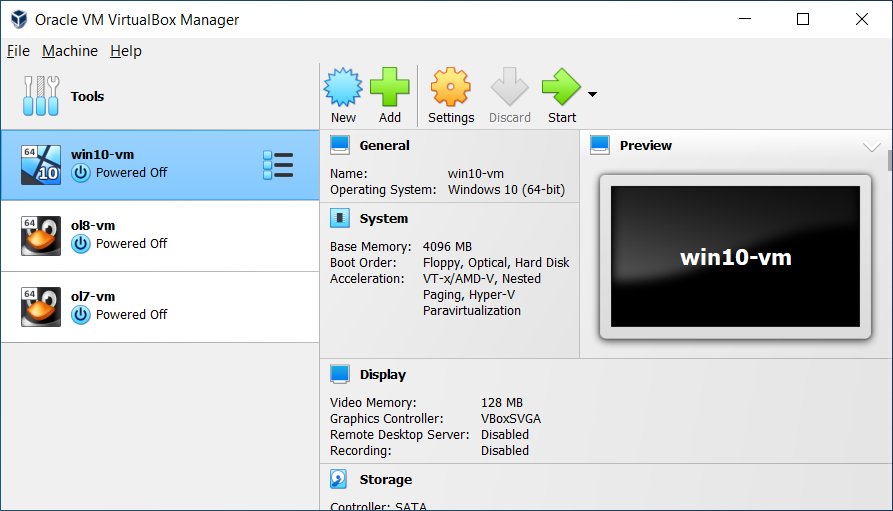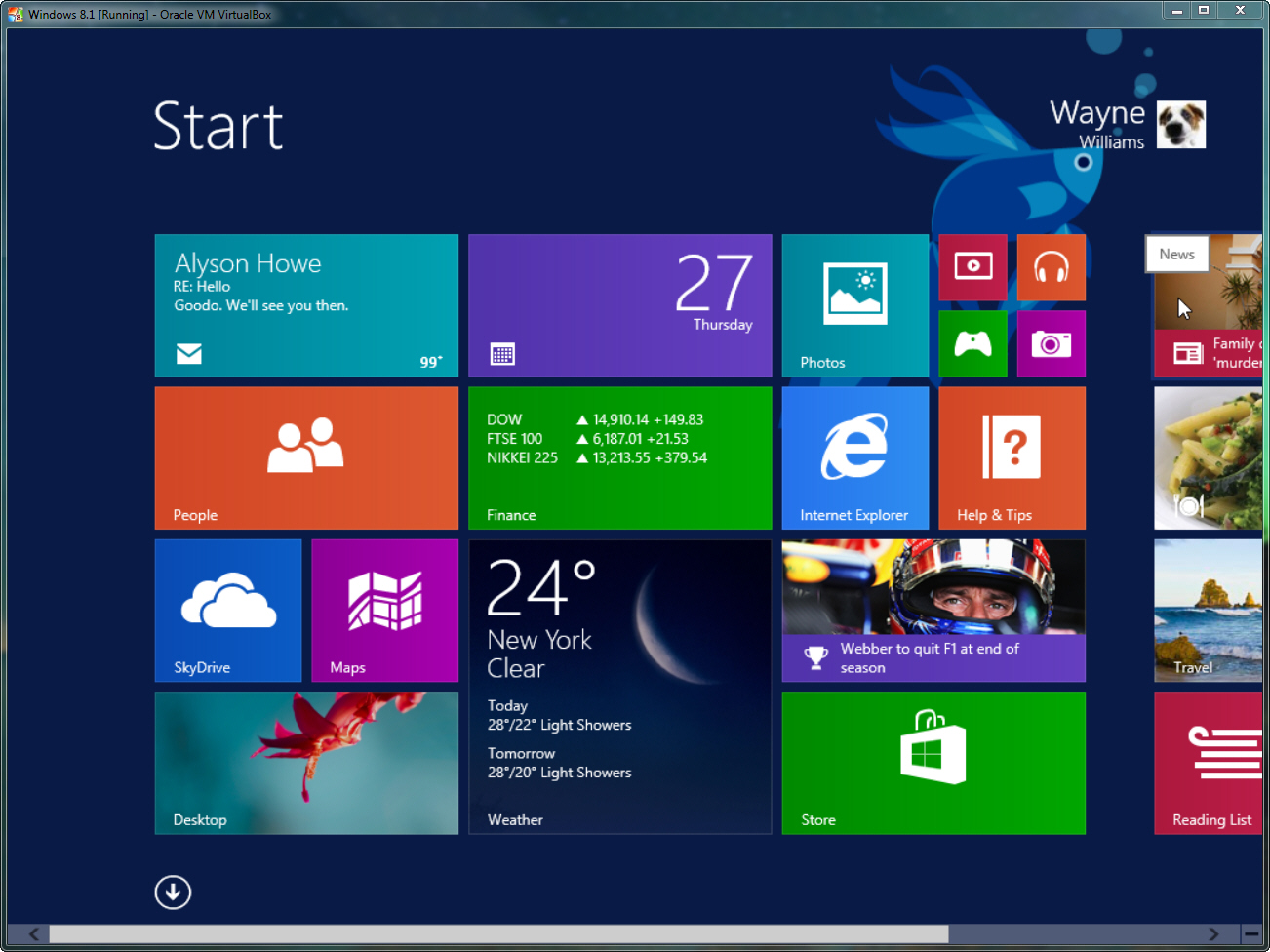VirtualBox is an open-source, free program solution for running any external operational systems on your PC in the virtual way. Using this software package, you may install literally any version of operational system, including Linux, FreeBSD, Solaris and, of course, any system from Windows generation and run it from your active Windows OS-build.
- We provide pre-built images for several open-source operating systems. Please note that: Every image contains the latest software as of the day the image was built. Performing updates is on your own, and may require looking for documentation to read using your favourite search engine.
- Note #2: The currently available Windows 10/IE11 image has expired and raised as a bug with Microsoft. As noted, setting your system date before April 15th, 2015 will allow this expired image to boot. Activating images. For Windows 7, 8, 8.1 and 10 images once connected to the Internet you will need to activate the OS trial to give a full 90.

We provide pre-built images for several open-source operating systems.
Please note that:
- Every image contains the latest software as of the day the image was built. Performing updates is on your own, and may require looking for documentation to read using your favourite search engine.
- Default usernames and passwords, where required, can be found next to the download link of each image. You are warmly invited to create your own user, or at least to change passwords, if you intend to use the images in a public environment.
Special purpose images.
GNU/Linux (GNU userland tools running on top of the Linux kernel)
- Archlinux (website).
- CentOS (website): the installation is done from the DVD, with default parameters set
- Damn Small Linux (website): the installation is done from the CD, with default parameters set.
- Debian (website): the installation has been done from the netinstall ISO image for the x86 architecture.
- DeLi Linux (website).
- Dreamlinux: the installation has been done from the CD, with default parameters set.
- Fedora (website).
- Fluxbuntu (website): the installation is done from the CD, with default parameters set.
- Gentoo (website): the installation is done from the ISO image, then customized .
- gNewSense (website): the installation is done from the CD, with default parameters set.
- gOS (website).
- Kubuntu (website): the installation is done from the CD, with default parameters set.
- LinuxMint (website): the installation is done from the CD, with default parameter set.
- Lubuntu (website): the installation is done from the CD, with default parameter set.
- Mandriva (website): the installation is done from the CD, with default parameters set.
- Manjaro (website): the installation is done from the CD, with default parameters set.
- Moblin 2 (website): the installation is done from the .img/.iso file provided by the project.
- moonOS (website).
- OpenSUSE (website).
- PCLinuxOS (website).
- Puppy Linux (website).
- Sidux (website).
- Slackware (website): the installation has been done from the first CD, selecting the bare minimum disk sets.
- SliTaz (website)
- Tiny Core Linux (website)
- Ubuntu (website): the installation is done from the CD, with default parameters set.
- Ubuntu Server (website): the installation is done from the CD.
- Ubuntu Studio (website): the installation is done from the CD, with default parameters set
- Xubuntu (website): the installation is done from the CD, with default parameters set.
- VectorLinux (website):the installation is done from the CD, with default parameters set.
- Zenwalk (website): the installation is done from the Standard Edition CD, with default parameters set.
GNU/OpenSolaris (GNU userland tools running on top of the OpenSolaris kernel)
- OpenSolaris (website).
- Nexenta(website): the installation is done from the CD.
- MILAX(website): the installation has been done from the official ISO image.
GNU/FreeBSD (GNU userland tools running on top of the FreeBSD kernel)
- Debian GNU/kFreeBSD (website): the installation has been done from the daily mini.iso.
BSD

- FreeBSD (website):the installation is done from the bootonly iso
Other
- AROS (website): the installation has been done from the nightly build ISO image.
- FreeDOS (website): the installation has been done from the official ISO image.
- Haiku (website): the image has been done from the nightly build HDD raw image.
- MINIX (website): the installation has been done from the official ISO image (MINIX 3).
- ReactOS (website): the installation has been done from the official ISO image.
- SYLLABLE (website): the installation has been done from the official ISO image.
- Android-x86 (website): the istallation has been done from the daily ISO image.
- Plan 9 (website): the installation has been done from the ISO image.
I have used Oracle VM VirtualBox in the past as well. It is a very fast, reliable and easy to use Virtualization software and the latest version natively support Windows 8.
Prerequisites to Install Windows 8 CP on Oracle VM VirtualBox
To install Windows 8 consumer preview on Oracle VM VirtualBox, you need to download download Windows 8 consumer preview .iso image from Microsoft website.

Once you have the Windows 8 CP .ISO image, download and install Oracle VM VirtualBox.
Launch the Oracle VM VirtualBox. The first step to install Windows 8 CP is to create a new virtual machine. You can do it by clicking the 'New' button in the toolbar or by selecting the 'New' submenu under the 'Machine' menu.
Virtualbox
Virtualbox Windows 8 Image
This will open a wizard and guide you through the process to create a new Virtual Machine.Once you complete the steps to create a new virtual machine, you can start the new virtual machine and start the installation process.
To start the virtual machine, go to the Oracle VM VirtualBox and select the new virtual machine on the left panel. Now click on the 'Start' button in the toolbar. This will launch the virtual machine you just created.
Wait a minute, did you mount the .ISO image with the virtual machine so that it can boot from it? If not, this is the best time for that.
When you start the virtual machine first time, it will guide you through a wizard and allow you to boot from a CD or .ISO file.
In the below screen, you can choose to boot from the CD/DVD drive or optionally choose an .ISO image. If you haven't burnt a DVD from the downloaded .ISO image, then click on the folder icon on the right side of the below screen. It will open the file dialog and allow you to choose the .ISO image of the Windows 8 Consumer Preview.
Just click the 'Start' button on the summary screen and you are ready to experience a new Windows 8.
If you start the virtual machine without an ISO image to boot from, it will give a boot error.
Windows 8 Virtualbox Image Download Pc

Windows 8 Virtualbox Image Download Windows 7
I remember I struggled a bit to get Windows 8 developer preview installed on the virtual machines earlier. But Windows 8 CP installation was a smooth and fun experience. You can follow the default options in most screens of the Windows 8 Consumer Preview installation.